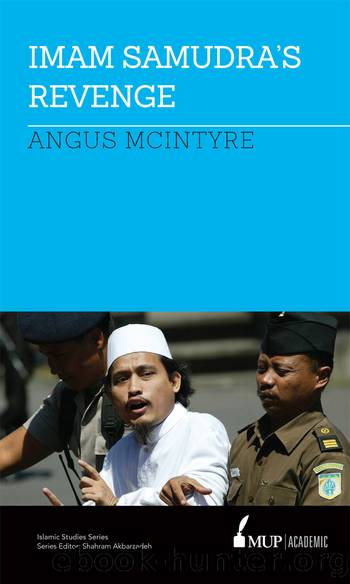Imam Samudra's Revenge by McIntyre Angus;

Author:McIntyre, Angus;
Language: eng
Format: epub
Publisher: Melbourne University Publishing
Bantenese Beginnings
Imam Samudraâs actual name was Abdul Aziz. He was born on 14 January 1970 in the town of Serang in north Banten to two natives of the area, Achmad Sihabuddin Nakaâi and Embay Badriah. According to Asep Adisaputra, the author of Imam Samudra Berjihad, he was the ninth of eleven children,8 although police interrogation reports of 21 and 27 November 2002 list the number of his siblings as eight, without indicating his place within the birth order. These three sources agree, however, that his eldest sibling, Ida, was dead, although we are not told when she died or in what circumstances.
His mother, Embay Badriah, claimed to be a descendant of Haji Wasid,9 the leader of a famous uprising against the Dutch, which began on 9 July 1888 in Cilegon, to the west of Serang. It was described by one historian as a quest for âdignity and self-respect in the context of the colonial situation.â10 She bypassed her other sons to express the hope that Aziz âwould inherit the heroic qualities of her ancestor.â11 She also said that he had been named Abdul Aziz as an expression of his parentsâ desireâa most ambitious one at thatâfor him âto become an important person and an honourable slave of Allah SWT [Subhanahu Wa Taala: Praise be to God and He is sublime] after the fashion of King Abdul Aziz [of Saudi Arabia].â12
Despite the weight of parental, especially maternal, expectation, Imam Samudra himself, although proud of his motherâs forebear, conceded that he was not particularly knowledgeable regarding this heroic figureâs background and history.13 More influential in his life was the mysticism of Bantenâs traditionalist Islam to which he was introduced by his father. Its significance lies not in its continuing influence upon him, but as a legacy of his boyhood that his later search for a purer form of Islam obliged him to repudiate. It is not irrelevant to this account of the formation of his identity that Abdul Aziz was a twice-born Muslim who rejected the traditionalist Islam of his early years making way for his subsequent embrace of, first, Salafism and then, in adulthood, global jihadism.
In an interview, he discussed this early involvement at the same time as he passed judgement on it from the standpoint of his subsequent beliefs. He stated:
The interesting thing is that Banten is well known for its mysticism ⦠yes, quite a large part of our family possessed this esoteric knowledge of invulnerability ⦠Father wore a diamond pin inserted in his forehead, that was normal ⦠In class 4 of elementary school I followed suit ⦠but it is in fact forbidden ⦠and I threw it away after attending Pesantren Ramadan [Islamic religious classes held during the month of Ramadan].14
Download
This site does not store any files on its server. We only index and link to content provided by other sites. Please contact the content providers to delete copyright contents if any and email us, we'll remove relevant links or contents immediately.
| Anthropology | Archaeology |
| Philosophy | Politics & Government |
| Social Sciences | Sociology |
| Women's Studies |
Cecilia; Or, Memoirs of an Heiress — Volume 1 by Fanny Burney(32075)
Cecilia; Or, Memoirs of an Heiress — Volume 3 by Fanny Burney(31469)
Cecilia; Or, Memoirs of an Heiress — Volume 2 by Fanny Burney(31419)
The Great Music City by Andrea Baker(30797)
We're Going to Need More Wine by Gabrielle Union(18643)
All the Missing Girls by Megan Miranda(14789)
Pimp by Iceberg Slim(13800)
Bombshells: Glamour Girls of a Lifetime by Sullivan Steve(13700)
Fifty Shades Freed by E L James(12926)
Talking to Strangers by Malcolm Gladwell(12889)
Norse Mythology by Gaiman Neil(12861)
For the Love of Europe by Rick Steves(11558)
Crazy Rich Asians by Kevin Kwan(8898)
Mindhunter: Inside the FBI's Elite Serial Crime Unit by John E. Douglas & Mark Olshaker(8722)
The Lost Art of Listening by Michael P. Nichols(7170)
Enlightenment Now: The Case for Reason, Science, Humanism, and Progress by Steven Pinker(6879)
The Four Agreements by Don Miguel Ruiz(6326)
Bad Blood by John Carreyrou(6285)
Weapons of Math Destruction by Cathy O'Neil(5848)
